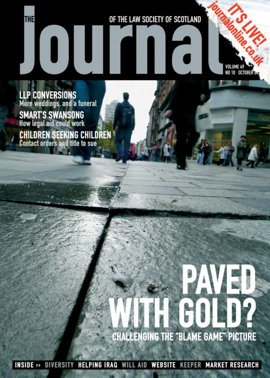The well unfair state
Practitioners who have ever dealt with social security appeals, be they solicitor representatives (although there exists a conspicuous dearth of solicitors in this often very complicated field), or perhaps even legally qualified tribunal chairpersons, will know how busy the Appeals Service is nowadays.
For example, take Wellington House, which handles appeals for claimants living in the Glasgow area. Five days a week, 15 separate tribunals hear cases from 10 am until late afternoon, spaced out at half hour intervals. A brief piece of arithmetic indicates that Wellington House might deal with 500 appeals per week. A proportion of these will be continued rather than proceed straightaway to a 30 minute or full hour hearing; nonetheless, these tribunals tend to be more willing actually to hear cases than, for example, the sheriff civil court.
The tribunals look at the claimant’s case afresh and may take a somewhat different view of the facts, or even interpret the regulations differently. Very often they overturn the Department of Work and Pensions’ decision and award or reinstate benefits. Further appeal lies on points of law only.
Claimants are almost invariably expected to attend in person, and the waiting hall of Wellington House often resembles a hospital ward as numerous plainly disabled and, frequently, distressed claimants await being called in.
Of particular concern to solicitors here at Govan Law Centre, who regularly practise in this field, is the prevalence of obviously needless appeals involving claimants with serious physical difficulties and/or mental health problems, who are refused incapacity benefit or disability living allowance. These pointless appeals are precipitated by the DWP’s apparent policy of routinely refusing and stopping claims. To this end they employ non-specialist medical practitioners to carry out perfunctory examinations, very often of claimants suffering from complex or rare conditions.
The sudden termination of a claimant’s ongoing entitlement can have a devastating impact, particularly in mental illness cases, where the claimant will find it extremely difficult to pick up the pieces. Where incapacity benefit is involved, housing benefit will also stop, resulting in rent arrears and frequently in eviction proceedings. Claimants will then have the unenviable and oppressively Catch-22 option of declaring themselves fit for work in order to qualify for jobseeker’s allowance, or insisting on their incapacity benefit claim and receiving income support subject to a 20% “benefit penalty”.
Where disability living allowance is involved, the impact can be just as traumatic, and again rent and mortgage arrears are commonplace along with other forms of indebtedness.
The process of form filling for an appeal can appear Kafkaesque, and finding an appropriately qualified representative can become a labyrinth beset with pitfalls – as mentioned, there is a dearth of solicitors, and unfortunately not all lay representatives possess the requisite knowledge or skills to act effectively (although undoubtedly some of them are excellent and could blow many of us away with their grasp of the subtleties of benefits law).
As well as the initial examination by a DWP doctor, it will be necessary for the representative to discuss often very intimate aspects of a claimant’s disability, and to arrange for subsequent medical examination – hopefully this time by an appropriately qualified doctor or psychiatrist. Then the day of the hearing comes, and the claimant has to endure this whole rigmarole of questioning by strangers yet again. “How many times a day do you soil your underwear, Mrs Smith?” Not nice, and tears are far commoner than in court.
Now, what makes all this so galling is that the DWP don’t even bother sending a presenting officer to defend their decisions. One can imagine three possible reasons for this. First, the decision was a matter of routine policy. Secondly, there is no statable defence. Thirdly, it is more profitable for the DWP to employ presenting officers in the business of turning claims down, rather than trying to justify these spurious decisions based on snapshot medical examinations – while presumably the government as a whole loses money, since it has to employ chairpersons, tribunal doctors and advisers, as well as a huge administrative staff. In our experience at Govan Law Centre, the SSAT very often upholds the claim, so no saving to the benefits budget there.
A number of modifications to the system would render it more efficient and much fairer. First, the policy of routine refusal, motivated as it appears to be by the misguided utilitarian calculus of budget-hugging, should be abandoned. Secondly, the DWP should employ appropriately qualified doctors. Thirdly, claimants should automatically be referred to a competent advice authority for help. Fourthly, ABWOR should be extended to cover SSATs to increase the number of solicitors willing to undertake this type of work.
Then, hopefully, Wellington House and its counterpart buildings up and down the country will resemble tribunal rooms again, as opposed to the waiting area at Lourdes.
Maggie Dickson and Jon Kiddie are solicitors at Govan Law Centre
In this issue
- Citizenship, society and solicitors
- The well unfair state
- Litigation nation
- Best medicine
- Take a deep breath
- What title?
- Walk this way?
- Know your strategy
- e-quilibrium?
- The researchers
- Rights out of anarchy
- Political correctness or positive change?
- Steering clear
- How far can a board go?
- Major role for new tribunal
- The race is on (again)
- Planning a superhighway
- Website reviews
- Book reviews
- Single survey's lonely heart
- In harmony
- Clearing the path






